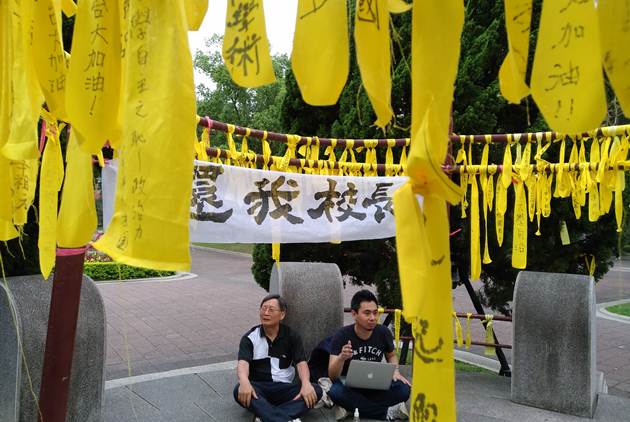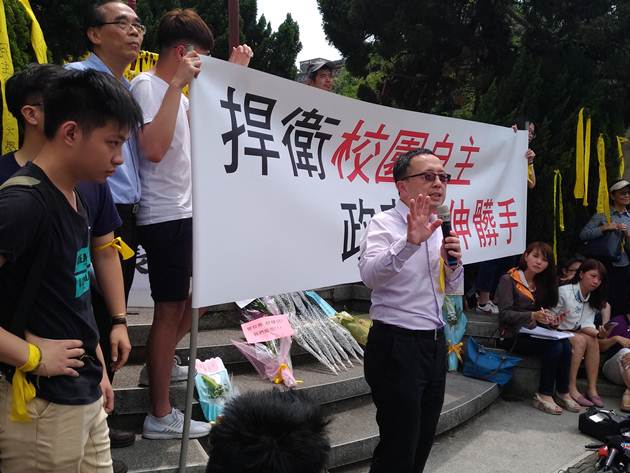Students, Faculty Sound Alarm Bell on University Autonomy

Source:Ming-Tang Huang
Yellow banners and ribbons fluttering along the scenic Royal Palm Boulevard at National Taiwan University (NTU), night and day recently indicate unrest on the renowned campus. Congregating at the school’s landmark Fu Bell Tower near the boulevard, faculty and students are sounding the alarm for Taiwan’s higher education.
Views
Students, Faculty Sound Alarm Bell on University Autonomy
By Jenny Chengweb only
A political backlash has been brewing since the Ministry of Education rejected the appointment of finance professor and former Cabinet member Kuan Chung-ming as NTU president late last month.
On May 4 at 4 p.m., NTU Fighting for University Autonomy, a coalition of faculty members, students and alumni, formally launched their New May Fourth Movement [The name pays homage to the anti-imperialist political student movement that began on May 4, 1919]. Holding up placards with slogans such as “Give us our president back” and “university self-government" nearly a thousand students and professors handed a complaint to interim NTU President Kuo Tei-wei in protest of the education ministry’s decision to disregard the results of the NTU presidential selection process. They claim that the ministry ignored decisions by the NTU President Selection Committee and the NTU School Affairs Council, and that politically motivated “black hands” are meddling with university self-government, urging faculty and students to stand up against authoritarian bullying and state violence.
The Association of National Universities of Taiwan, the Association of Private Universities and Colleges, and an action alliance for university autonomy, bringing together several prestigious national universities, have also issued a series of joint declarations. “We greatly admire the universities in Taiwan. In Malaysia, talking about university autonomy is out of the question;, Taiwan should treasure [this freedom],” remarks an international student from Malaysia, summing up his experience of “attending “class” with his teacher in front of the Fu Bell Tower a few days ago.
Political intervention clearly underlies the showdown between NTU and the education ministry. It is not only a thorough look into the details of the selection process and recusal provisions for conflicts of interest; on a deeper level, the conflict revolves around university autonomy.
Liu Yuan-tsun, professor emeritus with the Department of Physics of Soochow University, seeks to add some nuance: “I don’t talk about university autonomy; I talk about university self-government.” Liu participated in the formulation of legal amendments to the university president selection mechanism. He says that a university’s right to self-government is not meant to be expanded without limits, but should be enjoyed according to the law.
Article 162 of the Constitution stipulates that all public and private educational institutions shall, in accordance with the law, be subject to State supervision. Article 1 of the University Act states that universities shall be guaranteed academic freedom and shall enjoy autonomy within the range of laws and regulations. However, Chen Chao-ju, professor at the NTU College of Law, notes that university self-government does not mean that universities are completely independent of state supervision, but rather acts as an institutional safeguard to realize constitutionally guaranteed academic freedom and freedom of teaching.
According to a legal opinion made available by the education ministry, the legality and appropriateness of the NTU selection procedure is problematic (information leaks, conflict of interest , unlawfully holding concurrent posts, etc.). Therefore, the ministry demanded a new selection round.
Professor Liu, however, believes that the selection regulation issues do not constitute conflicts of interest or information leaks. Therefore, the circumstances do not warrant the rejection of Kuan’s selection. The process, he says, shows that political forces have been infiltrating the campus. Peng Shie-ming, professor at the NTU Chemistry Department, posits that the NTU procedure fulfilled education ministry requirements, and that the reasons the ministry cites for its insistence on a rerun of the selection process are not convincing.

Conflict Rooted in History
The virulent backlash against the government’s meddling with campus affairs can be traced back to Taiwan’s historical development. Chen points to a revision of the University Act in 1993 a imed at reducing interference by political forces in university affairs as Taiwan left authoritarian one-party rule behind.
Multiple amendments to the University Act in following years appear to have bolstered university self-government, yet the question remains whether universities can extricate themselves from political influence peddling. Do they really enjoy the "self-government” that they aspired to back in 1993? With the recent NTU controversy, people are beginning to have their doubts..
Wang Yu-jun, head of the National Taiwan University Graduate Student Association and a member of the NTU School Affairs Council, argued bluntly in a article that this instance would have been the best opportunity for the Council to demonstrate university self-government in action. But since the opinions of the students and the sponsors of various motions were not respected and the government team arbitrarily controlled the rules of procedure, the motions were shelved, rendering the implementation of university self-government impossible.
With the 1993 revision of the University Act, government-appointed university presidents became a thing of the past. The change was seen as a first step on the road to broader self-government. However, when it subsequently came to choosing mechanisms, manipulation and factional struggles remained threats at every turn, ranging from the controversy over whether to select a new president in a two-stage process involving the board of trustees and the selection committee or the selection committee alone, to the proportional composition of the selection committee.
Endless squabbling over various attempts to influence selections such as defamatory letters, vote brokers, vote buying, and vote allocation resulted in the process becoming increasingly populist and limited to an exclusive small circle. Back then, NTU strongly resisted the education ministry and rushed to implement university self-governance before the third reading of the revised University Act.
Chen Wei-cho, the incumbent convener of the current NTU President Selection Committee, became the first popularly elected university president and went on to serve a total of 12 years or three terms. Also disputed is the practice of some universities of appointing members of the selection committee to important posts once a president has been chosen.
Political Forces Never Left
Leaving aside the struggle in the name of university self-governance, political forces have never really left university campuses. In 2005, then Education Minister Tu Cheng-sheng picked second-ranked Lee Si-chen as the new NTU president. Peng remembers isolated protests and opposition on campus against perceived ministry interference in university affairs, but the protests were relatively small scale.
Similar demonstrations of dissent occurred several times when Tu appointed candidates who weren’t the respective selection committee’s first choice as presidents at six national universities, including National Taiwan Normal University (NTNU), National Taiwan University of the Arts, and National Chung Hsing University. NTNU President K.T. Huang (Huang Kuan-tsae) was dismissed by the education ministry only eight months into his term for failing to meet qualification requirements due to insufficient administrative experience.
Another revision of the University Act passed by the Llegislature in December of 2005 attempted to reduce political interference to a minimum. Under the revised Act, university presidents were selected in a single-stage process, and the education ministry authorized universities to design their respective selection procedures themselves. However, when it became known that the incumbent president of National Formosa University was standing for reelection while also handpicking the members of the selection committee, he was accused of trying to be player and referee at the same time. In 2014, when Edward Chow was picked as the new president of National Chengchi University, the entire selection process had to be repeated because the Selection Committee failed to meet the requirement of choosing from among two or more qualified candidates in the first round.
In 2015, National Cheng Kung University students held a protest, alleging that new President Jenny Su Huey-jen had been unfairly selected in non-transparent “black box” operations. The students took legal action, paralyzing the School Affairs Council twice. Su was only able to take office after the courts dismissed both lawsuits – one asking the Kaohsiung High Administrative Court to declare the administrative measure [of her appointment] null and void, and the other asking the Taipei High Administrative Court to suspend its execution.
Aside from the selection of presidents, political interference also affects the administrative affairs of universities. A closer look at the University Act shows that the education ministry controls a host of administrative matters. Student quotas, budgets, mergers, university president appointments, student recruitment models, student credit recognitions, miscellaneous fee adjustments, and the establishment of new departments and graduate schools as well as academia-industry collaboration schemes must all be approved by the education ministry. A running joke in academic circles is the claim that the entire island has only one “Education Ministry University".
To a certain degree, this joke also indicates that political forces or the government have never really retreated from university campuses. National Chiao Tung University President Frank Chang Mau-chung believes that it is virtually impossible in the current situation to fundamentally realize university self-government. Chang therefore sent a letter to all faculty members and students in his private capacity, expressing his hopes that the school seize the opportunity to tackle structural problems. Chang pointed out, “Now is our opportunity to explore the possibility of our university being incorporated as a public trust.”
When a university is incorporated, it means that the government-funded share of its budget declines, whereas the share to be raised by the school itself increases. On the other hand, the university gains more freedom regarding student quotas and budget allocation.
As the examples of European and American universities show, an incorporated university would rely on long-term contractual partnerships instead of a hierarchical superior-subordinate relationship.
In our interview, Chang notes that the University of California system is a public trust administered by a Board of Regents which allocates the budget based on the number of enrolled students. The president is appointed by the regents and is directly responsible to them, which is diametrically opposed to the system in Taiwan, where the Selection Committee is disbanded after a president has been produced, so that presidents are left to their own devices. “Taiwan’s biggest institutional problem is that there is no accountability mechanism. If you want university self-government, then there must also be responsibility,” says Chang.
Chang suggests that as a first step, a few selected universities could set up a joint board of trustees that would be composed of well- respected people from the outside the institutions. The education ministry would authorize the board to oversee the universities, whereas the universities would be authorized to cultivate trustee talent to ensure supervision and control. Earlier this year, the education ministry floated a similar idea, saying it would push for the incorporation of a few public and private universities on a trial basis.
Misgivings about the Privatization of Education
The main point of contention has always been concerns over the privatization of education. Chen, the NTU law professor, also fears that, should universities be simply left alone “free of supervision,” the government would then also be “free of obligations.” This would not be a recipe for solving the predicament of higher education since, once universities have become corporations, they could easily escape public oversight and would be at risk of becoming profit-seeking enterprises.
While no approach or system is flawless, the current debate and search for alternatives show that Taiwanese society attaches great importance to the self-government of the nation’s universities. Much more important than the current confrontation is the firm establishment of governmental duties and responsibilities toward the universities as well as a reexamination of how presidential candidates are produced and presidents chosen. Only if we tackle the problems from the system side will Taiwan’s higher education be strong enough to move forward.
Translated from the Chinese article by Susanne Ganz
Additional Reading
♦ Time to Reinvent College Education
♦ An Initiative that Misses the Point
♦ The Secret of the World’s Most Competitive Nation







